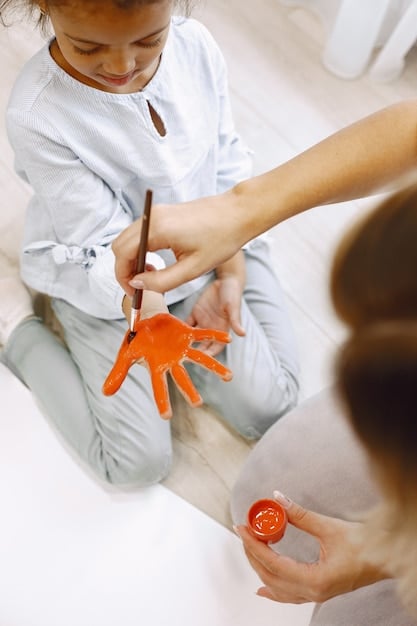How to Evaluate a Childcare Provider: Key Questions for 2025

Evaluating a childcare provider in the US in 2025 involves asking key questions about their experience, safety protocols, communication methods, and the overall environment they provide for children to ensure a nurturing and secure setting.
How to Evaluate a Childcare Provider: Key Questions to Ask in the US in 2025
Finding the right childcare provider is a critical decision for any parent. As we look ahead to 2025, it’s essential to know how to evaluate a childcare provider: key questions to ask in the US in 2025 to ensure your child’s safety, well-being, and development are in the best hands.
Understanding Your Childcare Needs
Before you even begin interviewing potential childcare providers, it’s crucial to have a clear understanding of your own needs and priorities. This self-assessment will help you narrow down your options and focus your search on providers who are the best fit for your family.
Consider things such as your work schedule, budget and desired location.
Identifying Your Priorities
What are the non-negotiables for your child’s care? Perhaps it’s a provider with extensive experience, a low child-to-staff ratio, or a specific educational philosophy. Clearly defining your priorities will help you evaluate providers more effectively.
Think about your values to see how it aligns with the staff and care programs.
Assessing Your Budget
Childcare costs can vary significantly depending on location, type of care, and the provider’s qualifications. Determine how much you can realistically afford to spend on childcare each month to avoid financial stress.
- Research average childcare costs in your area.
- Factor in additional expenses like transportation and meals.
- Explore potential financial assistance programs.
By understanding your needs, priorities, and budget, you’ll be well-prepared to begin the process of evaluating childcare providers and finding the perfect match for your family.
Understanding and identifying what you are looking for for your child sets the groundwork.
Checking Credentials and Qualifications
Once you have a list of potential childcare providers, it’s vital to thoroughly check their credentials and qualifications. This step will help you ensure that the providers you’re considering meet the minimum standards for safety, training, and experience.
Background checks and certificates are essential.

Verifying Licenses and Accreditations
In the US, childcare providers are typically required to be licensed by their state or local government. Check with your state’s childcare licensing agency to verify that potential providers have a valid license and are in good standing. Accreditation from reputable organizations can also be a good sign of quality.
Licensing insures they meet safety guidelines.
Reviewing Background Checks and References
Ask potential providers if they and their staff have undergone background checks. Don’t hesitate to request references from previous clients to get a better understanding of their experience and reputation.
- Request copies of background check reports.
- Contact references and ask detailed questions.
- Look for any red flags or concerns raised by previous clients.
Careful study of qualifications are important when choosing a caregiver.
By verifying licenses, accreditations, background checks, and references, you can ensure that you’re only considering providers who are qualified and trustworthy.
Assessing the Childcare Environment
The physical environment of the childcare facility can have a significant impact on your child’s well-being and development. When you visit potential providers, take the time to carefully assess the space for safety, cleanliness, and stimulation.
Does the environment promote growth?
Evaluating Safety Features
Look for potential hazards and ensure that the facility has appropriate safety measures in place. Check for things like covered electrical outlets, secure gates, and first-aid kits. It’s also important to ask about the provider’s emergency preparedness plan.
An environment for children must be safe.
Observing Cleanliness and Hygiene
A clean and hygienic environment is essential for preventing the spread of illness. Pay attention to the overall cleanliness of the facility, especially in areas like the kitchen, bathrooms, and diaper-changing stations. Make sure that staff members are following proper handwashing procedures.
Checking for Stimulation and Resources
Ensure that the facility offers a variety of age-appropriate toys, books, and activities to stimulate your child’s cognitive, social, and emotional development. Look for a balance of structured and unstructured play opportunities.
- Assess whether toys are clean, safe, and in good condition.
- Check for outdoor play areas with appropriate safety surfaces.
- Observe how children interact with the environment and materials.
Assessing the childcare environment in terms of safety, cleanliness, stimulation, and resources will help you determine if it’s a positive and nurturing space for your child.
Understanding the Provider’s Philosophy and Approach
A childcare provider’s philosophy and approach to care can significantly influence your child’s experience. It’s important to find a provider whose beliefs and practices align with your own values and parenting style.
Do their philosophies align with yours?
Inquiring About Their Educational Philosophy
Ask potential providers about their approach to education and child development. Do they follow a specific curriculum or educational philosophy, such as Montessori or Waldorf? How do they foster learning and creativity in children?
Ask detailed questions because this is important.
Asking About Discipline and Behavior Management
Understand how the provider handles discipline and behavior management. Are they using positive reinforcement techniques? What are the consequences for misbehavior? Make sure that their approach aligns with your own beliefs about discipline and guidance.
Discussing Communication and Parent Involvement
Establish clear expectations for communication and parent involvement. How often will you receive updates about your child’s day? Are there opportunities for parent-teacher conferences or participation in activities? A strong partnership between the provider and parents is essential for successful childcare.
- Determine how often the provider communicates with parents
- Ask about their policies on parental volunteering
- Inquire about how they handle sensitive issues or concerns
Choose a provider with similar values to yours.
By understanding a provider’s philosophy and approach to care, you can make an informed decision about whether they’re the right fit for your family.

Key Questions to Ask During Interviews
During interviews with potential childcare providers, asking the right questions is crucial for gathering the information you need to make an informed decision. These questions should cover a range of topics, from safety and qualifications to philosophy and communication.
Ask the right questions so you know.
Questions About Safety and Emergency Procedures
Your child’s safety should be your top priority. Ask detailed questions about the provider’s safety protocols and emergency procedures. For example, “What are your procedures for handling medical emergencies?” or “How do you ensure the safety of children during outdoor play?”
Safety is the most important part, ask questions about it.
Questions About Daily Routines and Activities
Gain a clear understanding of what your child’s day will look like. Ask about the daily routines, including meal times, nap times, and playtime. Inquire about the types of activities offered and how they align with your child’s interests and developmental needs.
Questions About Staff Training and Experience
Find out about the training and experience of the staff who will be caring for your child. Ask about their qualifications, certifications, and ongoing professional development. It’s also important to inquire about staff turnover rates and how the provider ensures consistency in care.
- Ask about the provider’s sick child policy.
- Inquire about their policies on administering medication.
- Ask whether staff members are certified in first aid and CPR.
By asking these questions, you can gather essential information about the provider’s safety measures, daily routines, and staff qualifications, helping you make a well-informed decision.
Trusting Your Instincts and Making a Decision
After you’ve conducted your research, visited facilities, and asked questions, it’s time to trust your instincts and make a decision. Choosing a childcare provider is a deeply personal choice, and it’s important to feel confident and comfortable with your decision.
Trust you feelings and the research you have done.
Reflecting on Your Observations and Impressions
Take some time to reflect on your observations and impressions from your visits. Were you impressed with the environment and the staff? Did you feel like your child would be happy and well-cared for in this setting? Trust your gut feeling and choose a provider that resonates with you.
Trust how you feel within the facilities.
Seeking Feedback from Other Parents
Reach out to other parents in your community and ask for their recommendations and experiences with local childcare providers. Hearing firsthand accounts from other families can provide valuable insights and help you feel more confident in your decision.
Understanding the Trial Period
Many childcare providers offer a trial period, allowing you to see how your child adapts to the environment before making a long-term commitment. Take advantage of this opportunity to observe your child’s interactions with the staff and other children, and to assess whether the provider is truly a good fit for your family.
- Observe how your child interacts with the staff and other children.
- Check in with your child regularly to see how they’re feeling.
- Be open to adjusting your expectations or considering other options if the trial period isn’t successful.
By reflecting on your observations, seeking feedback from other parents, and taking advantage of trial periods, you can make a confident and informed decision about your child’s care.
| Key Aspect | Brief Description |
|---|---|
| 🔑 Credentials & Qualifications | Verify licenses, accreditations, and background checks. |
| 🏡 Childcare Environment | Assess safety, cleanliness, and stimulation levels. |
| 💬 Provider Philosophy | Understand their approach to education and discipline. |
| ❓ Key Questions | Ask about safety, routines, and staff experience. |
Frequently Asked Questions
▼
The safety and well-being of your child should be paramount. Ensure the provider has proper licensing, background checks, and a secure environment. Observing how they interact with children during your visit is also crucial.
▼
Check with your state’s childcare licensing agency to confirm that the provider has a valid license and is in good standing. Also, ask for references from other parents and contact them to inquire about their experiences.
▼
Ask about their educational background, certifications in first aid and CPR, and years of experience working with children. Inquire about their training in child development and behavior management techniques to ensure they are well-prepared.
▼
A provider is a good fit when their values, philosophy, and approach to childcare align with your own. Strong communication, a supportive environment, and a positive interaction with your child are all good indicators of a suitable match.
▼
A good communicator provides regular updates on your child’s activities, milestones, and any concerns. They should be responsive, open to feedback, and willing to discuss any issues that may arise, creating a trusting relationship.
Conclusion
Choosing a childcare provider is a significant decision that requires careful consideration. By understanding your needs, checking credentials, assessing the environment, understanding philosophies, asking key questions, and trusting your instincts, you can find the perfect caregiver for your child in 2025, ensuring their safety, happiness, and development.





